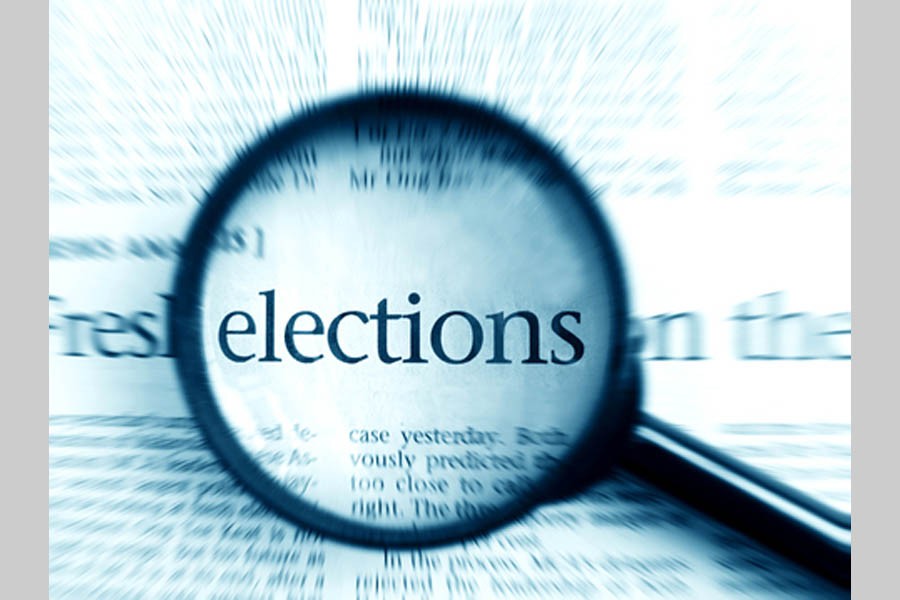Like the two Eids in a year, the five-yearly national election in Bangladesh is a festive occasion unless, of course, it is not marred by violence or otherwise. We can only wish a free, fair and participatory election that would help earn credibility of the system of governance.
Of late, Bangladesh is being dubbed a "development puzzle" indicating that she has been developing fast defying all assumptions laid out in text books of economics. From a 'Test case of development' coined in the 1970s, she has successfully graduated as a 'roll-model' for other developing countries. Economic growth rate has crossed 7.0 per cent per annum for the past few years; socio-economic indicators are comparatively better both in absolute and relative terms. But to it seems, there is also a precocious political puzzle which is not much discussed in political discourse. But it warrants no less attention than economic ones. It is that, people of one of the poorest countries like Bangladesh prefer a rich political culture of western democracy; they abhor authoritarian rules. People of this country voted for the creation of Pakistan, relentlessly fought for people's rights during Pakistan period that culminated in a sovereign state under the dynamic leadership of Bangabandhu Sheikh Mujibur Rahman in 1971. In independent Bangladesh, the cry for democracy got louder and louder even when autocratic rule was at its ruthless. People even had to shed blood for restoration of democracy. By all accounts, an election per se is only a necessary condition for democracy but not sufficient. Elections under different systems continued since Pakistan era but the establishment of democratic institutions and culture have sorely been missing even now.
Before any general election, in any country, the economy generally follows a slow lane especially those related to investment, stock market etc. A syndrome of 'wait and watch' apparently persists. This is mainly because economic agents wait to see who comes to power, what policy changes are on the cards. It is no wonder that investment and transactions in stock market would turn bearish for few months till the election is over. However, if post-election political instability prolongs, the economy might fall to a relatively low equilibrium trap. It is thus our expectation that not only the election should be fair, but also post-election problems should be minimum as far as possible.
However the economy looks good on another count. The Election Commission is likely to spend about Tk 7.0-10 billion for holding the general election, assuming each candidate spends minimum Tk 10 million and if there are three candidates in a constituency, a total of another Tk 1.0 billion, plus at least Tk, 10 million development spending in each area would put further Tk 3.0 billion. These together would keep the aggregate demand (especially consumption and government expenditures) up through multiplier and linkage effects, Thus despite a 'wait and watch' syndrome, there is also a 'run and catch' syndrome to beef up the aggregate demand.
Social scientists are usually in agreement that democratic governance is better than dictatorial governance as far as economy is concerned. Nobel Laureate Amartya Sen argued for democracy by saying that famine is less likely to occur in a democratic system because of open media and opinion that keeps government on its toes. In Bangladesh, both economic and social indicators witnessed an upward trend in pseudo- democratic system (only general election) than in non-election system. Had democratic institutions grown up over time, Bangladesh would possibly earn extra mileage from the march.
Political stability is a pre-condition for economic growth and private investment fuels growth. The upcoming general election needs to be credible to ensure both. Besides, a continuity of past policies to reach a middle-income country status, and bringing down poverty to less than 10 per cent by 2030, to complete the developmental mega projects that have been rolled, to ensure transparency in the use of scarce resources and most importantly, to strengthen democratic institutions the upcoming election is very crucial. Let us minimise the costs to maximise the gains coming out of the general election.
Bad luck for Bangladesh, even after 45 years of existence as an independent state, the country could not reach a consensus on the ways elections would be held. The caretaker system was introduced as the then government in power failed to ensure a fair poll; the caretaker government also, especially, during the tenure of a military-backed one, miserably failed to keep up the spirit of the system. Any suspicion over a free, fair and participatory election should be dispelled.
Economic growth without political stability is achievable but it is unlikely to be sustainable in the long-run. And for political stability, the nation needs credible elections both at national and local levels.
Abdul Bayes is a former Professor of Economics at Jahangirnagar University.


